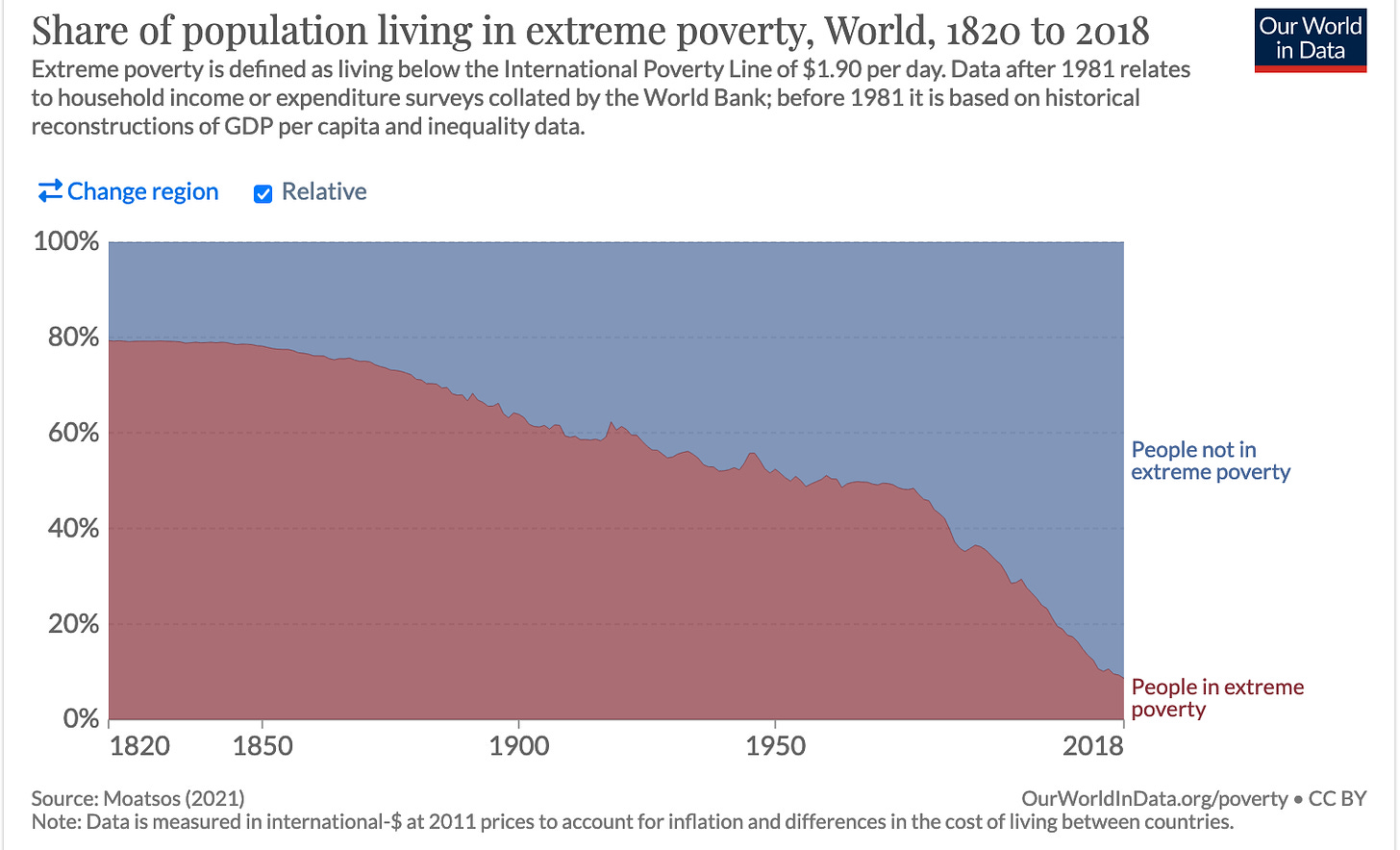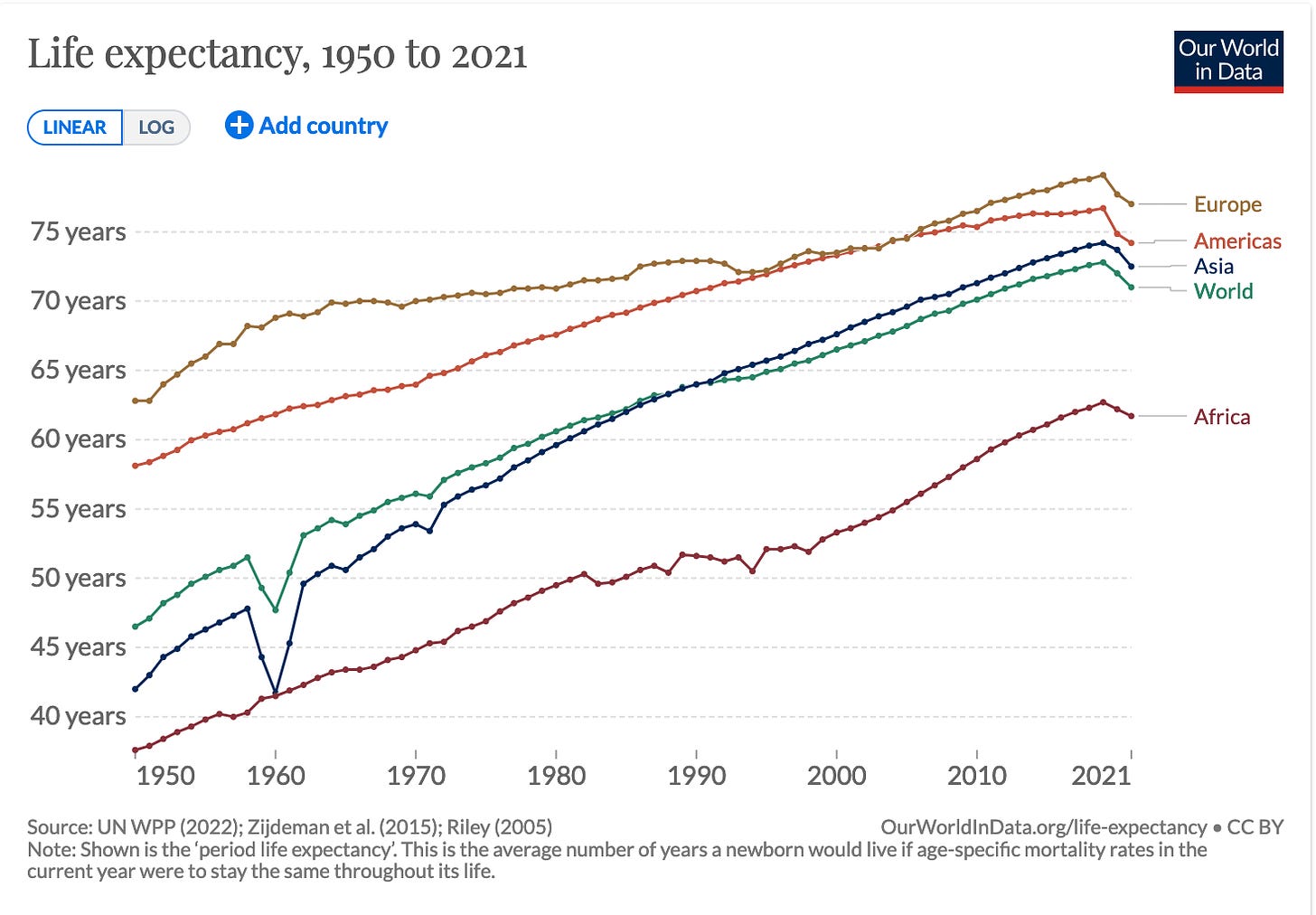Não se percebe como ainda não importamos esta tecnologia Austríaca.
Actualidade Internacional
- Iniciador de Tópicos dragao86
- Data de início
- Estado
- Não está aberto para novas respostas.
Mais opções
Comentários PremiadosUma das cagadas da URSS já terminou.
O Nagorno Karabak deixou de existir
O Nagorno Karabak deixou de existir

Man who spent £12,000 to become 'human border collie' says cruel dogs won't play with him
Japan's viral human dog Toco is struggling to make friends with both real and non-real dogs
E aquela que dizia que os Galos violavam as galinhas.... ?
E aqueles que na sua ausência não podem ser tratados por her/him , tem de ser they ?
Ca foda leva a lavoura se os maluquinhos triunfarem
Wtf

Why the world isn't as bad as you think
News coverage is terrible at capturing the biggest good news stories: the long-term trends that show vast improvements in human living standards across long stretches of time. We need to fix that.
Why the world isn't as bad as you think
News coverage is terrible at capturing the biggest good news stories: the long-term trends that show vast improvements in human living standards across long stretches of time. We need to fix that.

Pop quiz: what percentage of the global population currently lives in extreme poverty—defined as earning less than $1.90 per day?
Most of us have no clue how to even start to answer that question. Maybe a number floats into your head, but it’s likely a wild guess. The reason is simple: the way we’re given information about the world isn’t designed to make us understand big picture data or long-term trends. Instead, we get information from a 24-hour news cycle, which is a peculiar institution. How does it work? To put it bluntly, it works like this:
The news is mostly an aggregation of every bad event that happened in the last twenty four hours, anywhere on Earth.
That last clause—anywhere on Earth—is particularly important. In the past, citizens in the US, UK, or Australia simply wouldn’t know about a huge number of tragedies unfolding in countless distant parts of the world. Now, we do—almost instantly.
In a globalized 24-hour news cycle, which we check and refresh incessantly, it’s easy to get the impression that the world is uniformly a disaster-zone, run by malicious idiots. Then, we step away from our screens, go for a walk, and it doesn’t seem so dire.
It’s important to be well-informed about tragic events, because tragedies cry out for action. If we care about other humans, we need to know when they’re suffering, particularly if we can do something about it. Mass shootings, terrorist attacks, wildfires and hurricanes spurred by climate change, war updates, police killings, fresh revelations about economic downturns—all of these debacles warrant our attention.
But they are events, and because the focus lies squarely on them, we lose sight of the major, gradual shifts in our world that, like slow drips of water, seem insignificant on any given day, but can eventually cause a flood. Drips add up.
The best good news you’ve never heard
Let’s return to the pop quiz, because the answer to it is wonderful. The correct answer is about 8%. In isolation, that’s a terrible figure—about one in every twelve people on the planet tries to survive on $1.90 per day, or less. We need to fix that. But when you zoom out and look at the bigger picture, that figure is an astonishing, but hidden, achievement of modern humanity.
Here’s the data on extreme poverty, from 1820 to 2018, compiled by Our World in Data. Note: these figures are adjusted for inflation, so it’s comparing apples to apples.

This is amazing. Two hundred years ago, 80 percent of the world’s population was living in extreme poverty, or four out of every five people. By the 1950s, that figure was about 50 percent, and it didn’t budge for some time. By 1980, not much had changed. 45 percent of the global population was still in extreme poverty. Then, it got much better, much faster.
By 2000, the proportion had dropped to 26 percent. Two decades later, we’re rapidly heading toward 5 percent. That is astonishing. My parents and I were both born into a world in which roughly 1 out of every 2 people in the world were in extreme poverty, whereas the next generation will be born into a world where that figure is approaching 1 in 20.
Have you ever heard about that on the news?
The same applies to life expectancy—a measure that matters to most of us far more than any news event ever will.
Here were the life expectancies for key regions in 1950:
- Africa: 37.6 years
- Asia: 42.0 years
- Americas: 58.1 years
- Europe: 62.8 years
- Africa: 62.7 years (+25.1 years)
- Asia: 74.2 years (+32.2 years)
- Americas: 76.7 years (+18.6 years)
- Europe: 79.1 years (+16.3 years)

There is a common misconception that human lifespans have lengthened—that it would have been impossible to see an ancient Roman who lived to be 80 years old. That’s not true; the possible human lifespan has been roughly similar throughout history, and people (particularly rich people) did occasionally live quite a long time. But for most of the history of our species, the average person died young. That, mercifully, is no longer true.
Some of the big gains have been remarkably recent and swift. In Africa, for example, life expectancy shot up from 58 to 63 between 2009 and 2019—an enormous shift of five extra years in just one decade. Yet, most stories about Sub-Saharan Africa don’t convey that positive trend. Instead, we hear about war, famine, and political chaos.
Don’t get me wrong: such tragedies deserve more attention (after all, much of my PhD research involved traveling across sub-Saharan Africa to study recent coups d’état and civil wars). But we sometimes also need to see the bigger picture, which is often obscured by the modern model of news production and consumption.
Bad events, good trends, and “news hooks”
There’s a “Good News Movement” out there, which critiques media coverage for making people feel depressed. “Why do you have to focus on all the bad stuff? What about the random acts of kindness that go unnoticed?” they say. While I like feel-good videos as much as the next person, this is a misreading of the problem and the proposed solution is a hollow one.
We shouldn’t ignore real problems to focus our attention on anecdotes that make us feel warm and fuzzy. It’s great to see a video of a police officer going out of their way to help someone cross the street, but that doesn’t negate the need to cover it when Tyre Nichols gets violently beaten to death by five cops. Nichols’ death does make me depressed about the state of the world, but ignoring it to focus on feel good anecdotes isn’t a reasonable solution.
However, there is a real problem with the news that deserves a real solution: we need to find a way to convey positive trends to counterbalance negative events.
In practice, this doesn’t happen, because everything needs a news hook, which is industry jargon for saying: “If you want to cover something, connect it to an event that just happened.” There are good reasons why that editoral practice exists, not least because it’s what generates the most clicks and attracts the most ears and eyeballs to a given story.
But what is the news hook for a steady, gradual decline of human suffering on a vast scale? There isn’t one. Life expectancy shifts are meaningful over years, not days, and the near eradication of extreme poverty isn’t associated with something happening on a particular date, or a specific press release. As a result, most people only have a vague idea about these astonishing trends.
This is one of the liberating aspects of writing this newsletter. I can write about whatever I think is interesting or important. When I wrote a weekly column for The Washington Post, I always had to justify a pitch with a news hook. I’m not exaggerating when I say that an event that happened one day ago was sometimes too old for an editor to say yes to a pitch for a column. But a lot of really important ideas that are worth discussing don’t have news hooks.
The news has an “event bias”
The news, at its core, is about change. The world has become different in some way, and the news is there to help you learn about that change.
It’s an incredibly strange, misguided notion that we should mostly discuss ideas that neatly fit into the arbitrary subset of events that occurred in the previous 24 hours. If you want to write about life expectancy, wait for the United Nations to talk about it! If you want to write about guns, wait for a mass shooting! (Unfortunately, these days those who want to write about guns in the US rarely have a long wait).
But the point is that the news should not just be a passive observer of events. News should be a conduit for information that helps people make sense of the world.
The focus on events is partly a focus of convenience and tradition. It’s easier to wait for things to happen and then cover them. Plus, it’s how it’s normally done.
But the events bias is also derived from the fact that events have storylines, and humans are, to borrow the phrase from Jonathan Gottschall, a “storytelling animal.” That’s why police chases like the infamous one with OJ Simpson were such ratings gold, because it was an event that was overflowing with dramatic tension. We all need to know how the story ends.
News events can be like thrillers. Trends, reported on in the wrong way, are like reading a boring history book.
It doesn’t have to be that way. Skilled journalists can tell stories that illustrate important trends while still being gripping. (The story of extreme poverty almost disappearing can be turned into an incredible piece of reporting about inter-generational change in China; here’s one example). Long form journalism captures these dynamics much better, in my view, and I’m proud to write monthly for The Atlantic, where my editor wants smart ideas even if they’re not tied to a specific news cycle.
But unfortunately, the way that most people experience the news isn’t through slower, big picture journalism, but rather through breaking news in newspapers, or cable TV shows where anything beyond a five minute discussion is classified as a lengthy segment. And to cater to news consumers with short attention spans in the age of digital dopamine, it makes sense to cover and discuss a series of events in quick succession.
As a result, we sometimes use the phrase “well-informed” to describe the same kind of person who can be classified as a “news junkie.” But if you ask them a broader question like: “What percentage of the world’s population lives in extreme poverty?” they’re often stumped. That’s an indictment of our news industry. If you know the minutiae of day-to-day horse race politics in the 2024 presidential race but lose sight of the bigger picture about the world and its people, are you truly “well-informed?”
We can now bring these two important concepts together.
- The world isn’t as bad as you think, because news reporting aggregates the worst events in the world, giving you a skewed perspective.
- To truly understand the world, we don’t need more happy-go-lucky stories to make us feel good, but we do need more reporting of bigger trends and what’s driving them. Many of those big picture trends are invisible, but positive.
But next time you’re feeling crushing despair about the state of humanity, open up Our World in Data and marvel at some of the incredible progress we’ve achieved in just one generation.
And then, go for a walk.
Um génio autêntico. O nosso salvador.. o salvador das democracias da ditadura do politicamente correto.. pqp.. com sorte diz que para se deter o aumento do nível da água dos oceanos deverão fazer-se fogueiras que assim a água evapora..Não se percebe como ainda não importamos esta tecnologia Austríaca.
Eurodeputados querem reforço de regulamento sobre liberdade de imprensa
Última edição:

Joe Biden aprova construção de muro de 32 quilómetros no Sul do Texas
Governo de Biden tem sido criticado pela forma como lida com a crise migratória.
Ate porque os nao sei quanto kms que o Trump construiu tao a resultar que e um mimo...
Joe Biden aprova construção de muro de 32 quilómetros no Sul do Texas
Governo de Biden tem sido criticado pela forma como lida com a crise migratória.www.cmjornal.pt

San Francisco launches guaranteed income program for transgender residents
The Guaranteed Income for Transgender People pilot program will provide 55 residents with $1,200 per month for 18 months, plus healthcare and financial coaching.

Polícia encontra corpos de traficantes suspeitos de matar três médicos no Rio de Janeiro
As autoridades encontraram quatro corpos de dentro de dois carros. Um deles ainda não foi identificado.
No meio de tanto caos, o Brasil tem algumas virtudes ( não estou a falar das gajas boas de Copacabana). Se algum escumalha fizer mal á tua família, podes sempre arranjar que seja pior que eles.
Mas não tinha sido bandeira de campanha o não ao muro?
Joe Biden aprova construção de muro de 32 quilómetros no Sul do Texas
Governo de Biden tem sido criticado pela forma como lida com a crise migratória.www.cmjornal.pt
Andam todos na mesma escola fdx...
É aproveitar e limpar de uma vez os terroristas do hamas e companhia lda.
Muito bem o Hamas merece ser eliminado. Mas e o que dizer daqueles que vivem nos colonatos? Ou do massacre diário que fazem sobre a Faixa de Gaza?É aproveitar e limpar de uma vez os terroristas do hamas e companhia lda.
Enviado do meu iPhone usando o Tapatalk
Loucura… Israel acaba com a faixa de Gaza se for preciso…É aproveitar e limpar de uma vez os terroristas do hamas e companhia lda.
O típico caso de “cadeia alimentar”.
O mundo é isto. Quantos dos 6 biliões libertados pelos EU ao governo do Irão acabaram no Hamas? Ao mesmo tempo q uma “onda” de Iranianos ja veio hoje suportar Israel nesta “guerra” nas redes sociais…
Israel toma posições que, por vezes, não são as melhores, e muitos que não têm culpa nenhuma no conflito acabam por pagar pelos atos terroristas de outros.Muito bem o Hamas merece ser eliminado. Mas e o que dizer daqueles que vivem nos colonatos? Ou do massacre diário que fazem sobre a Faixa de Gaza?
Enviado do meu iPhone usando o Tapatalk
O diálogo é fundamental para a "paz," mas com os terroristas que rodeiam Israel, é complicado manter algum tipo de diplomacia.
Uma coisa é certa, quem atacou e
(e quem financiou) acaba de assinar a sua sentença de morte.
Israel não vai perdoar e a resposta que vai dar provavelmente vai surpreender muita gente.
Por outro lado, há que investigar o porquê de ninguém saber que este ataque estava ser planeado. Não estamos a falar de meia dúzia de terroristas, estamos a falar de uma invasão de larga escala por terra, ar w mar. Quem falhou ? Porque falhou ? Isto terá de ser investigado e a responsabilidade terá de ser assumida.
Enviado do meu CPH2211 através do Tapatalk
(e quem financiou) acaba de assinar a sua sentença de morte.
Israel não vai perdoar e a resposta que vai dar provavelmente vai surpreender muita gente.
Por outro lado, há que investigar o porquê de ninguém saber que este ataque estava ser planeado. Não estamos a falar de meia dúzia de terroristas, estamos a falar de uma invasão de larga escala por terra, ar w mar. Quem falhou ? Porque falhou ? Isto terá de ser investigado e a responsabilidade terá de ser assumida.
Enviado do meu CPH2211 através do Tapatalk
- Estado
- Não está aberto para novas respostas.

